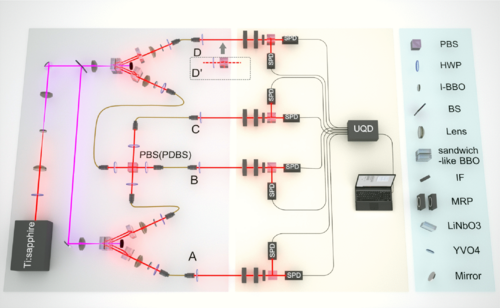Researchers Certify Device-Independent Genuine Multipartite Entanglement
Recently, Prof. LI Chuanfeng, Prof. HUANG Yunfeng, Prof. CHEN Geng, and their colleagues from Prof. GUO Guangcan's group at the University of Science and Technology of China (USTC) of the Chinese Academy of Sciences (CAS), collaborating with Swiss academicians, have first certified device-independent genuine multipartite entanglement and inventeda new method to certify genuine multipartite entanglement without making any assumptions on the internal functioning of the measurement device.Their work was published inPhysical Review Letters.
Genuine multipartite entanglement is considered the most potent form of entanglement and an essential resource for quantum information processing. The full knowledge of the dimensions of the system and accurate calibrations of the measuring instruments that are needed for detecting genuine multipartite entanglement are usually challenging to acquire in an experiment. In principle, the entanglement properties of a system can be tested by using device-independent measurements and analyzing the violation of Bell inequality in the measurement results without making any assumptions on the system. However, certifying device-independent genuine multipartite entanglement in an arbitrary finite dimension remains challenging due to the difficulty in identifying optimal multipartite Bell inequalities.
By decomposing the internal structure of the multipartite system, the group delineated the minimum covering sets and the full covering sets respectively. They then applied the bipartite Bell inequality to examine the multipartite entanglement system. This method could certify genuine multipartite entanglement in arbitrary sizes and forms by using only theClauser-Horne-Shimony-Holt (CHSH) inequality. It could also measure the weight of genuine multipartite entanglement in multipartite entanglement.

Experiment setup for certification of four-photon entanglement. (Image by ZHANG Chao et al.)
The group experimented on four-photon entangled states, and the results showed that the full covering is very tolerant to noise and the minimum covering can achieve higher efficiency while being robust to noise, that is, the number of the measurement devices does not scale exponentially with the system size. Several vital forms of multipartite entangled states were examined in the experiment, and measurements of both coverings proved the existence of genuine multipartite entanglement. The researchers also calculated the weights of genuine multipartite entanglement in different forms.
More importantly, the group examined a weakly entangled state that has been proven unable to violate the standard multipartite Bell inequality, which previouslymade it difficult to determine its genuine entanglement properties by device-independent methods. But in this work which used the new method of decomposing the structure, such weakly entangled states violated the local bound and were confirmed to be genuine multipartite entanglement.
Paper link: https://journals.aps.org/prl/abstract/10.1103/PhysRevLett.129.190503
(Written by MA Xuange, edited by ZHANG Yihang, USTC News Center)
Back
